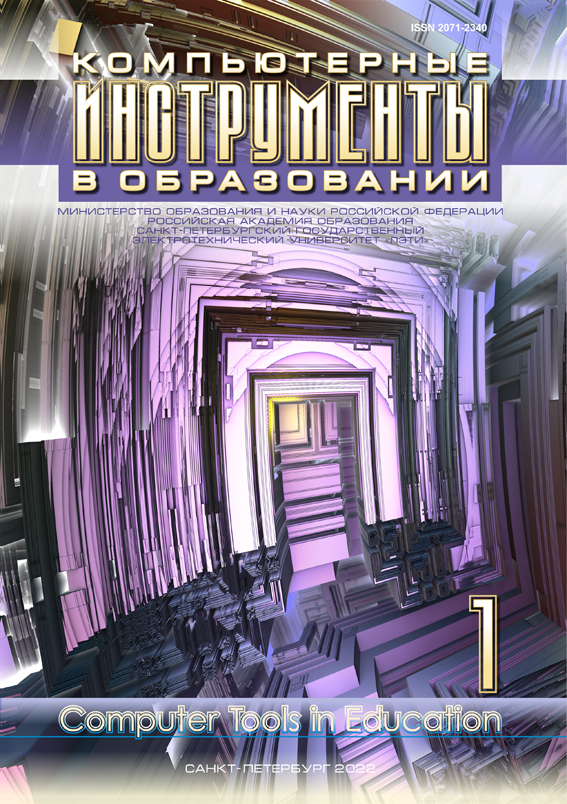Methodologies of Including Project Engineering Activities in the Curriculum of Pedagogical Universities. Experience of Herzen State University
Abstract
The article discusses the problems associated with the organization of engineering practices and design and technological production practices in pedagogical universities both in pedagogical areas of training and in non-pedagogical areas of training, for example, “Applied Mathematics and Informatics”. A comparative analysis of three different methods is carried out on the example of the practice organization of s at two faculties of the Russian State Pedagogical University. A. I. Herzen and one of the St. Petersburg's secondary schools.
References
Ya. I. Kuz’minov, I. D. Frumin, and L. Ovcharova, eds., “Dvenadcat’ reshenij dlya novogo obrazovaniya: doklad Centra strategicheskih razrabotok i Vysshej shkoly ekonomiki,” in Proc. XIX April International Academic Conference on Economic and Social Development, Moscow: HSE University, 2018 (in Russian).
G. I. Gerasimov, “From the Sciences of Education to the Education Science,” Humanities of the South of Russia, vol. 6, no. 4, pp. 275–290, 2017 (in Russian); doi: 10.23683/2227-8656.2017.4.26
V. V. Rubtsov, V. A. Lektorsky, A. G. Asmolov, et al., “From Joint Activity to the Construction of New Social Communities: Jointness. Creativity. Education. School (Roundtable of the methodological seminar supervised by V.V. Rubtsov and B.D. Elkonin),” Cultural-Historical Psychology, vol. 14, no. 3, pp. 5–30, 2018 (in Russian); doi: 10.17759/chp.2018140301
UG.RU, “Tsifrovaya transformatsiya sistemy obrazovaniya proiskhodit khaotichno,” in UG.RU, 19 Nov. 2020. [Online] (in Russian). Available: https://ug.ru/czifrovaya-transformacziya-sistemy-obrazovaniya-proishodit-haotichno/
M. Yu. Puchkov, V. A. Popova, and I. P. Efimov, “Emerdzhentnost’ protiv avtoriteta — zhizn’ v stremi-tel’nom budushchem. Formirovanie prestizha professii inzhenera u sovremennykh shkol’nikov,” in Proc. Engineering education as a response to the challenges of society (PMOF 2021) Collection of articles of the IX All-Russian scientific and practical conference with international participation, St. Petersburg, Russia: Akademiya Vostokovedeniya, 2021, pp. 16–22 (in Russian).
L. Lubimov, “Аuthor’s Concept Of School Education Modernization,” in Sovremennaya analitika obrazovaniya series, vol. 2 (32), Moscow: HSE University, pp. 1–81, 2020 (in Russian).
A. Uvarov, “The Digital Transformation And Scenarios for The General Education Development,” in Sovremennaya analitika obrazovaniya series, vol. 16 (46), Moscow: HSE University, pp. 1–109, 2020 (in Russian).
A. P. Usoltsev and T. N. Shamalo, “Developing The Innovative Mentality Of Secondary School Students,” The Education and Science Journal, no. 4 (113), pp. 17–30, 2014 (in Russian); doi: 10.17853/1994-5639-2014-4-17-30
I. P. Efimov, N. L. Korsakova, A. V. Miroschevskaya, V. A. Popova, and M. Y. Phuchkov, “From Convergence Of Science To Convergence Of Education: Field Report,” in Proc. of Problemy pedagogicheskoi innovatiki v professional’nom obrazovanii: Materialy XX Mezhdunarodnoi nauchno-prakticheskoi konferentsii, St. Petersburg, 26–27 Apr. 2019, St. Petersburg: Herzen University, 2019, pp. 389–394 (in Russian).

This work is licensed under a Creative Commons Attribution 4.0 International License.







